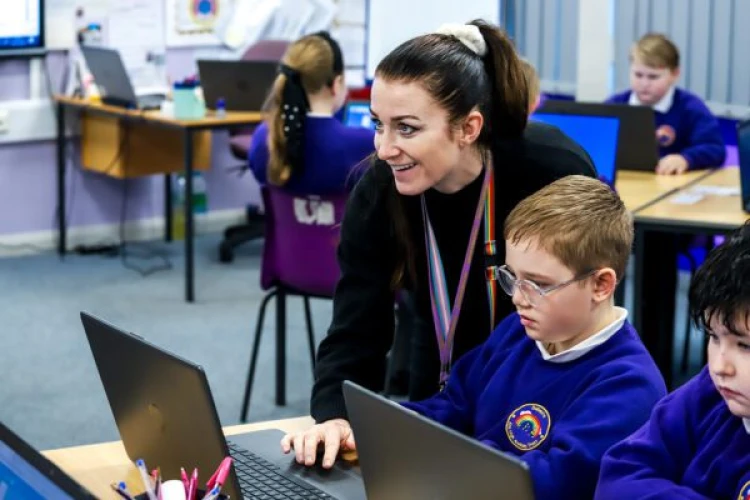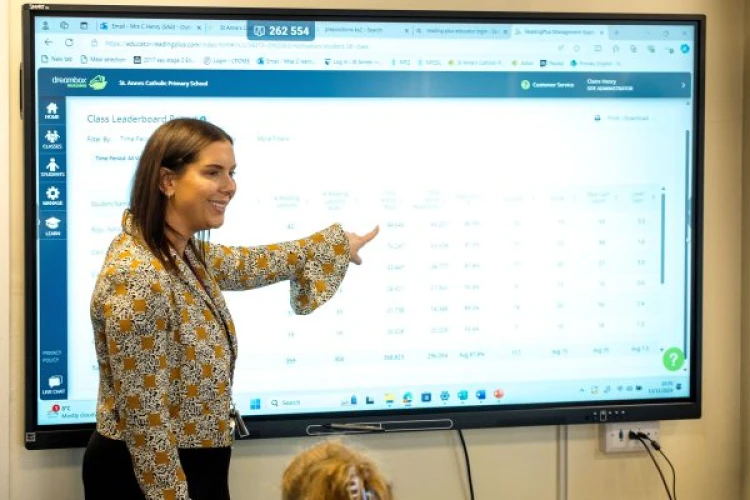Read Paradigm Trust’s independent research into the effectiveness of Reading Plus in improving pupils’ reading
As Director of Curriculum and Pedagogy at Paradigm Trust, Ben Rogers oversees the implementation and effectiveness of Reading Plus across all of the trust’s schools.
He sat with us to discuss:
- How he uses Reading Plus data to track progress trust-wide.
- How the programme is implemented across the trust.
- The results of Reading Plus – and his independent study into the programme's results.
“It has a large impact if it's used well. When it works, it works really well.”
Why was your trust looking for support with reading?
We've got three London primary schools in a catchment with a high percentage of EAL and ethnic minority students and children eligible for pupil premium - groups who typically struggle the most with reading attainment. We have been successful with them; however, some children are still not making the progress we would like them to make.
In Ipswich, we also have two primaries, a secondary school and a special school, which we were trying to get up to speed with our London schools.
We were looking to improve fluency and thought a reading programme that helped fluency, but also wider reading, would be useful. That's why we looked at Reading Plus.
An English Lead in one of our secondaries introduced the programme to us. We piloted with a small group at one of our London schools and saw a big boost in results. The headteacher was convinced Reading Plus had a really big impact, so we rolled it out across the whole trust.

Reading Plus’s effectiveness
I've been impressed with the children who are using it well and making good progress, especially the lower-attaining pupils or those who are a little behind.
The middle and high attainers who use it properly also make good progress.
To properly assess the value of Reading Plus, I conducted my own research with data from the 2023/24 Year 5 cohort. The study analyses the usage of Reading Plus and compares it to progress as measured by pupils’ PIRA scores.
The study
The numbers in the tables are scaled point scores like the SATs. If a group of learners made an average progress of +4, it’s the equivalent of jumping from a scaled score of 96 to 100.
When pupils had high quiz success, they achieved:
- +8.6 points – Lower-attaining pupils
- +3.5 points – Middle-attaining pupils
- +0.8 points – High-attaining pupils
When pupils had a high number of Combos, they achieved:
- +8.9 points – Lower-attaining pupils
- +4.0 points – Middle-attaining pupils
- +0.6 points – High-attaining pupils

Our overall conclusions show:
- Simple usage of Reading Plus is not a strong predictor of progress.
- Passing quizzes and getting Combos has a strong effect on progress.
- Lower prior-attaining pupils benefit the most from Reading Plus.
How do you implement Reading Plus across your trust?
In our primaries, we only introduce Reading Plus after their phonics programme. This is usually around Year 3. We allocate an hour a week, and I’m pretty relaxed when they do that hour.
I monitor the number of lessons and quizzes they do. If they haven't done those three lessons a week, I contact them to check if everything is OK and if I can offer support.
For our secondaries, it’s an hour a week for all children as well. We've tried various methods of implementation.
Last year, the science department delivered it for term one, the English department for term two and the maths department for term three.
It was very easy to make the case to science and maths that they need to be invested in pupils’ reading. The science GCSE paper has a reading age of around 16/17. So, your pupil with a reading age of 14 will struggle no matter how knowledgeable they are.
This year, we've timetabled them for the whole year as we found that behaviour and work ethic slipped when a pupil’s teacher continually changed. Whereas, when a pupil and teacher have a rapport, you can monitor and intervene more accurately - which increases the effectiveness of Reading Plus.

How successful was the set-up and training process?
Training from Daisy Education has been strong and supportive. They’re always ready to do one-on-ones.
An example that stands out is one of our special schools struggling with motivation. Daisy Education jumped on a Zoom call and talked it through, which was really, really helpful. Whenever staff are new or stuck, the response from Daisy Education is amazingly quick, detailed and high quality.
Some staff think you can just set the kids off on the computer, and it'll be amazing. You have to properly teach, monitor and motivate pupils. When it works, it works really well.
Regarding our monitoring, I'm communicating with schools each week, saying: ‘These classes are doing amazingly well,” or “These classes are falling behind - can you check what's going on?”
How have Reading Plus reports helped with staff workload and lesson planning?
It has helped me identify which pupils are dropping through the net. These are now the children I'm directing teachers to sit next to.
I find it useful to be able to download the data from the back end - it lets you be forensic.
I spoke with one of our SENCOs recently; we listed all the children underperforming on Reading Plus and the data showed they weren't doing many lessons or quizzes. It was interesting because they were already watching that child as they thought they may have additional needs.
So it's helping us be a bit more forensic in identifying special and additional needs and might be revealing something deeper that we haven't spotted before.

What would you say to other MAT leaders considering implementing Reading Plus?
It has a large impact if it's used well. Training and customer service is excellent. If I ask a question, I get replies in minutes.
A CEO or a Trust Leadership Team need to think about how you will monitor it and ensure teachers know what to look for so that no child slips through the net. Once you're doing that, the package comes into its own. It really does hold the pupil's hand through the system.
Interested in seeing the impact Reading Plus can have on your pupils?
Get four weeks’ full access to Reading Plus – for free!
See the impact of the award-winning programme before you decide whether to purchase.
When used as recommended, we expect students will:
- Make six months’ progress in comprehension levels in text complexity.
- Increase their reading speed by 20 words per minute.

